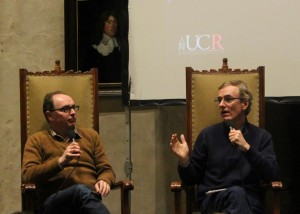Jitse Amelink
UCR Class of 2015
Interview with Veritas Forum speaker Tim O’Connor
Last Thursday, February 20, the annual Veritas Forum took pl ace, this year taking on the topic of free will and the neurosciences. A lively, though technical debate emerged between American philosopher Tim O’Connor and his Belgian opponent Jan Verplaetse in front of a jam-packed audience in the Burgerzaal.
ace, this year taking on the topic of free will and the neurosciences. A lively, though technical debate emerged between American philosopher Tim O’Connor and his Belgian opponent Jan Verplaetse in front of a jam-packed audience in the Burgerzaal.
Earlier that day I met Tim O’Connor at the hotel where he was staying. Holding his umbrella slightly clumsily, Mr. O’Connor and I headed to the nearest coffee place in town. I apologized for the rain, at which point he amiably replied that the tracks of the train he took this morning in England were actually under water, due to the heavy rains and flooding there.
As a prominent defender of free will in the contemporary free will debate, he explained over a brownie and some decaf coffee that his interest in free will is primarily a conceptual one. “I believe we have a solid degree of control over our actions. We are causally motivated in our actions, but not compelled by these causes. I am also very interested in the mechanism of action for this control”, he said.
“Science has the tools to study humans systematically. I would consider free will disproven if, with a high degree of accuracy, real, meaningful decisions in everyday life could be predicted due to neuronal activity, while I have no awareness whatsoever of this decision myself at that time. That would be a powerful confirmation that free will does not exist. But current findings do not show an absence of free will at all. It does, however, show that our awareness of control is sometimes imperfect and clinical psychology also shows how fragile this control sometimes can be.”
In the meantime he showed me some pictures of a pub he went to during an earlier visit to Amsterdam, enthusiastically speaking about the special beers they had there, as well as his earlier travels this year. He is currently on a sabbatical in Oxford, with his wife and youngest daughter, writing a book on reason, science, and the Christian faith.
“The value of Christianity for me is not so much the set of beliefs, even though that’s part of it, but much more important is that you embrace a way of life. It changes how you look at others, how you live your daily life. You realize that others are also incredibly valuable. On a different level, the eternal perspective can deflate suffering and disappointments, for example when our attempts for justice fail. It doesn’t mean that you can stop fighting though. If you look at what Jesus did and said, he clearly shows to love others and fight for justice in the here and now.”
An agnostic during high school, he converted after a process of reflection at university. The questions this raised drove him to philosophy. “My faith and my thinking in philosophy share different outlooks. They’re complementary. Philosophy made me comfortable with uncertainty, since a lot of arguments can be made in favor of any view. There is no perfect answer in that sense. Studying philosophy helped me understand the nature of reasonable belief, as outside mathematics we cannot have full-fledged proof of anything. In metaphysics you basically choose the least bad option.”
During the debate, Jan Verplaetse challenged his view on decisions, saying that decisions begin unconsciously and only reach consciousness later on. “We don’t have time to directly influence our decisions. Neuronal activity generally precedes consciousness. A direct top-down influence borders on the edge between science and magic.” Mr. O’Connor replied: “Well, I don’t believe in magic, but I think that, akin to genes not functioning without their context, neurons function in a certain context, which does allow for top-down processes.”
The evening left many in the audience with more questions than answers. The afternoon rain had turned into to a clouded, humid, night as we headed for the pub to properly philosophize over a good old beer.
Jitse Amelink, Class of 2014, is a Neuroscience major from Steenwijk, The Netherlands
